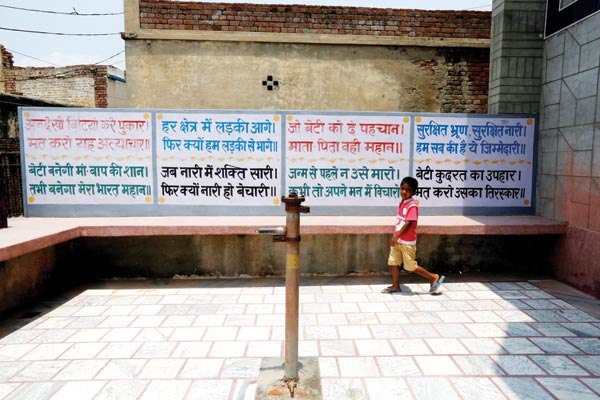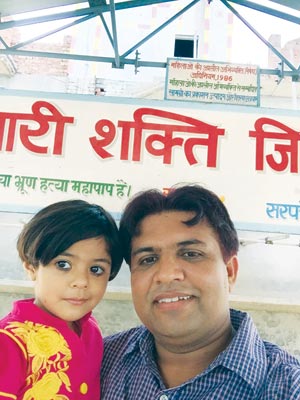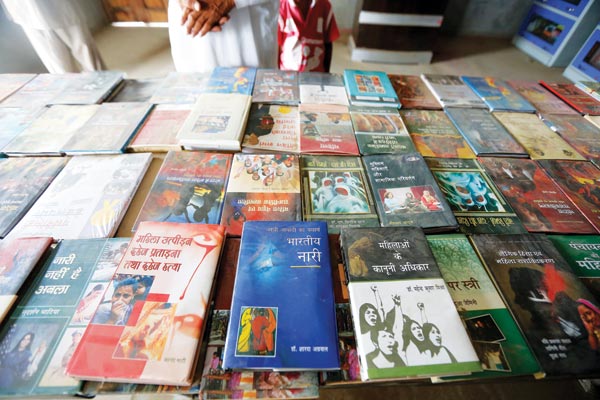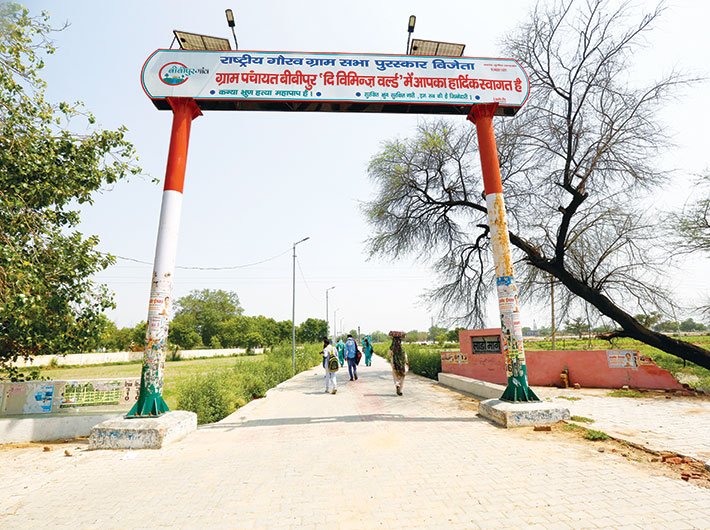The photograph of the Danish prime minister Helle Thorning-Schmidt’s ‘selfie’ with American president Barack Obama and British prime minister David Cameron at South African leader Nelson Mandela’s memorial celebration in December 2013, invited scorn, criticism and outright anger at their supposed insensitivity. The incident led to multitude of debates over selfies and selfie etiquette. Selfies have since been associated with ‘mental disorder’ too, though these claims have proved to be a hoax.
But Sunil Jaglan’s ‘Beti Bachao, Selfie Banao’ contest, which is now ‘Selfie-with-Daughter’ campaign, has given a positive social spin to the narcissistic trait, if not a negative attribute. What’s more, Jaglan is a 33-year-old sarpanch of a village in Haryana, the state more often in news for khaps and killing its daughters than much else. That something has changed in the small village in Jind district 130 km from New Delhi is evident when Santosh Devi – she doesn’t know her exact age but looks well into her 80s – says she will make sure her granddaughter studies till she wants. “I have told her that I will give my pension money to her to study. My daughter could not be taught much but I want my granddaughter to become a doctor or an engineer,” Devi, a mother of nine, tells Governance Now, pride showing in her cobwebbed eyes.

So what exactly did Jaglan do? He started a contest for people – mainly fathers – to click selfies with their daughters to win prizes. This in a Haryana village would take some doing. At best indifferent to their daughters, people were forced to think. Soon, it reached the ears of tech-savvy prime minister Narendra Modi, who lauded Jaglan in his fortnightly radio talk, ‘Mann Ki Baat’.
Jaglan has organised many events in the past to promote girl child welfare. But the selfie initiative was the most unexpected, given his rural background. Asked where he got the idea from, he smiles. “I have been working for women empowerment for the last five years – holding seminars on female foeticide, infanticide and honour killings. Sometime ago I saw actor Shah Rukh Khan’s selfie with his daughter. I realised selfies are a craze with the people, including our prime minister, and would make the perfect medium to communicate with them. Hence, I decided to club this latest trend with my motto of saving the girl child to create the ‘Beti Bachao, Selfie Banao’ contest,” says Jaglan.
If Jaglan appreciated the PM’s love for selfies, the latter did not let him down. On June 28, he told radio listeners that through social media he kept himself connected with people as also informed about the good and the bad works of the government.
Narrating the good work done by Jaglan, a public representative, the PM said, “Sometimes, a person sitting in a remote village does something that touches our heart. As you know, the government has taken the ‘Beti Bachao-Beti Padhao’ (save daughters-teach daughters) initiative. But when a person, society, village makes a government initiative their own, its strength is increased. Sunil Jaglan, the sarpanch of Bibipur village in Haryana, has taken a very interesting initiative. He organised a competition called ‘Selfie with Daughter’ in his village and has created such an atmosphere that every father has felt motivated to click a selfie with his daughter and share it on social network.”
 While appreciating Jaglan’s initiative, Modi asked people to click a selfie with their daughters and share it on social media with #SelfieWithDaughter and a tagline promoting the ‘Beti Bachao-Beti Padhao’ initiative.
While appreciating Jaglan’s initiative, Modi asked people to click a selfie with their daughters and share it on social media with #SelfieWithDaughter and a tagline promoting the ‘Beti Bachao-Beti Padhao’ initiative.
Following the PM’s address, social media lapped up the concept and helped it spread. Fathers across the country took to Twitter to post selfies with their daughters. Jaglan, meanwhile, is hogging the limelight. The recognition, however, has come after a long and sustained campaign in his village and at the end (on June 6) of a fruitful term as the sarpanch of Bibipur.
Starting from the beginning
The gate announcing the entry of village Bibipur smacks of idealism, allowing doubts to creep in. The red letters on the white board read (in Hindi), Welcome to Gram Panchayat Bibipur – The Women’s World. Such a proclamation in a village of a state with one of the worst sex ratios seems incongruous.
We enter the village a little unsure. But scepticism starts to fade away as we step into Jaglan’s drawing room. A bookshelf packed with books and bundles of files make for the chief attraction in the room, as the walls display numerous citations and awards won by the Bibipur panchayat and its sarpanch. Two objects in the room pique our curiosity further. A report peeping out from a magazine stand in a corner, titled ‘Girl Rising: Empowering Women in India’, and a framed newspaper report hanging on a wall. The latter talks about a grand khap panchayat organised in July 2012 that resolved to fight female foeticide. Khaps in popular imagination are linked to caste-related violence. When the same institution tries to upturn the social order, it implies fundamental change in attitudes.
Bani Singh, one of the members of Bibipur panchayat, says, “We organised the maha khap panchayat on July 14, 2012 when people from more than 100 khaps came from all across Haryana, Punjab, Rajasthan and even Uttar Pradesh. Here we took up the issue of female foeticide and encouraged women to participate and speak in it, as this issue cannot be addressed without their strong will.” Singh adds, “We condemned female foeticide and marked it as murder and called for serious punishment for those who practise it.”
While the excitement is palpable as people speak of the initiatives taken to curb female foeticide in particular and gender discrimination in general, at 867 women for 1,000 men (Census 2011), the sex ratio of Bibipur still remains lower than the aggregate for Haryana at 879. Bani Singh helpfully explains: “For generations the evil of killing the girl child has been prevalent. It will take some time, but we are very hopeful that a time will come when everyone will celebrate the birth of a girl child as they do of sons.”

He adds, “We know the sex ratio in our village is negative but we are certain it will turn positive soon. Last year 52 girls were born in our village against 41 boys.”
While Jaglan started working for women’s cause soon after he became the sarpanch in 2010, it was on January 24, 2012 that his resolve got a new energy. Jaglan recounts, “It was on this date my daughter was born. When I was informed about it I was elated and got sweets for the hospital staff. But the nurses refused to accept it because it was a girl. Also, there is an old tradition of calling eunuchs to dance to celebrate the birth of a son in the family. But I called them the next day to my home to celebrate the birth of my daughter. People in my village assumed I had had a son. When they got to know that it was a baby girl, they were confused as to why I was celebrating. This made me think of the extent of gender bias in our society and decided to step up and do something about this ingrained discrimination.”
Kicking the burden
In his book ‘Bride Burning in India: A Socio Legal Study’, Mohd Umar has stated that one of the important reasons for rural indebtedness is dowry. Farmers have to resort to taking loans to provide dowry for their daughters’ wedding and unknowingly get into a debt trap.
Bibipur has taken some serious steps to end this custom. “We realised that daughters have to be given dowry which makes them a burden. So we decided that we will not take dowry for our sons. In my own son’s wedding, the baarat constituted of only 20 people. It was done to ensure that the family of the girl did not have to incur huge expenses,” says Bani Singh.
Folksongs of new age
Jaibhagwan Pawar, a member of the panchayat, introduces us to Sheela Devi. In her early 60s, she is in more than one way a catalyst for the changing mindsets in her village. She writes songs and sings them to make people understand the importance of a daughter. She recounts with a smile how she clicked pictures with her granddaughters and participated in the selfie contest. We ask her to sing for us. Immediately she clears her throat and starts singing: “Beti nahi bachaoge to bahu kahan se lauge (If you don’t save the daughter, how will you get a daughter-in-law).”
While some may argue the opening lines of the song speak from a patriarchal mindset which sees women in limited roles, but then the song goes on to laud women greats. “Kanya Lakshmi Bai thi, jisne ladi ladai thi, kanya Kalpana Chawla thi, jisne jahaj udai thi (Braveheart Lakshmi Bai was also a woman and so was Kalpana Chawla who flew to space),” sings Sheela Devi with confidence and infectious pride.
She is joined in her enthusiasm by many others – old and young – to take up the cause and work for the rights of women in their village.
Women are members of panchayat samitis and regularly meet at the ‘Mahila Shakti Sthal’ and ‘Mahila Chabutra’ overlooking the village pond named ‘Lado Sarovar’ – all constructed for women and their names evoking woman power – where they sit around discussing social issues affecting the village.
Not just symbolism
Hindi translations of ‘The 7 Habits of Highly Effective People’ by Stephen R. Covey and ‘Maximum Achievement: Strategies and Skills That Will Unlock Your Hidden Powers to Succeed’ by Brian Tracy rest on the wooden tables in the room. A hardbound copy of ‘A History of Doing: Movements for Women’s Rights and Feminism in India, 1900-1990’ by Radha Kumar sits in one of the six glass-door almirahs in the library along with a host of literature on women’s issues. We ask the caretaker of the library on the second floor of the two-storeyed building as to who gets all these books and if people actually read them. He retorts, “You come here on Sunday and then you can see women lined up to get these books issued.”
He tells us that Jaglan, with the help of the panchayat, had built the library and visits Delhi regularly to order new books. Jaglan is helped by his sister Ritu in all his initiatives. We ask her how a small village in Haryana with entrenched caste and gender prejudices became so progressive. Ritu says, “My father was a teacher and an educated man. He gave us same opportunities as to our brothers. But then it was not the same everywhere. The change which you are seeing has not taken place overnight. We have been working for the last five years for this. It is just that now people have come to know about the work done by our panchayat.”
The writing on the wall
The village seems to have taken the initiative too seriously. And it shows in the writing on the walls, of the village. Catchy slogans are painted on walls all over the village. One such slogan talks of daughters being gifts from heaven and should not be disrespected – ‘beti hai kudrat ka uphaar, mat karo uska tiraskar’. Another says, ‘janam se pahle na usko maro, kabhi toh apne man mein vicharo’ (think before killing a girl even before she is born).
Change is visible but then how does this young sarpanch managed to challenge the age-old notions of patriarchal superiority. We ask him whether he faced opposition for his work and reformative zeal. “The stereotype of an inferior female class is deep-rooted in the minds of the elderly in my village. Ask them why it is so, and they have no answer. Probably they are concerned as to who will take care of them in their old age after their daughters get married. For many reasons I find these customs illogical. I often wonder why only girls are expected to leave their homes to go to their husbands’ homes. Why can’t a boy come to (live in) the bride’s home? These traditions are completely groundless and should be removed as soon as possible,” Jaglan explains with polished wisdom.
As we try to gauge the genuineness of his intent further, he adds, “Our education system is completely flawed. Concerns over social issues and dogmas are not taken up in universities. There has been so much research on such issues but it is not inculcated in the curricula. Students in schools should read on issues such as female foeticide and come up with solutions to remove it. The problem lies in the thinking of people. There has been extensive technological growth and development in the country. Now it is time to develop ‘technology of thinking’ in order to remove misconceptions and prejudices in people’s minds.”
Sunil Jaglan has become a household name, not just in his village but across Jind district. With all the limelight he is getting now, does he intend to pursue a political career more actively now that his term at the panchayat is over? “I don’t have any such aim so far,” he says. For now, however, he is busy giving interviews and meeting politicians.
shishir@governancenow.com
(The story appears in the July 16-31, 2015 issue)
